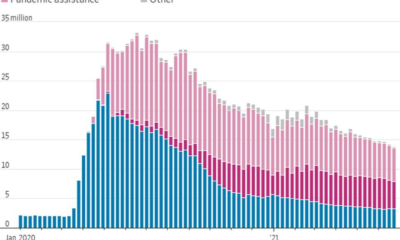Business
Divided government is more productive than you think

Despite underperforming on Election Day, the GOP gains will have a major impact on what’s accomplished in the coming two years.
Additional climate change policy? Don’t count on it. National abortion legislation? Not a chance. Voting rights? Not likely.
Plus, Republicans have indicated they will use any leverage they can find – including the debt ceiling – to force spending cuts.
While you might immediately think this is all a recipe for a stalemate in Washington, I was surprised to read the argument, backed up by research, that the US government actually overperforms during periods of divided government.
Those periods are coming more and more frequently, by the way. While there used to be relatively long periods of a decade or more during which one party controlled all of Washington, recent presidents have lost
Barack Obama, Donald Trump and George W. Bush each saw their party lose the House. President Joe Biden will join that club.
The two Republicans in the ’80s and ‘90s – Ronald Reagan and George H.W. Bush – both had productive presidencies and never enjoyed a sympathetic congressional majority. The last president to enjoy unified government throughout his presidency was Democrat Jimmy Carter, and voters did not look very kindly on him in the final analysis.
What’s below are excerpts from separate phone conversations conducted before the midterm election with Frances Lee and James Curry, authors of the 2020 book, Lee is a professor of politics and public affairs at Princeton University, and Curry is a political science professor at the University of Utah. What led me to them was their 2020 argument that divided government overperforms and unified government underperforms expectations.
It’s the normal state of affairs in our politics in the modern era. Since 1980, something like two-thirds of the time we’ve had a divided government.
And yet you think about all the things that government has undertaken in the years since the Second World War. The role and scope of the US government is so much greater now than it was then. And a lot of that happened in divided government. Most of that has been under divided government time. …
Unified government usually results in disappointment for the party in power, which is just exactly what we’ve seen here in (this) Congress. Democrats were unable to deliver on their bold agenda, and that’s not different than what Republicans faced when they had unified government and couldn’t pass repeal and replace of Obamacare.
Now hold on. Republicans passed a massive tax cut bill with unified government. Democrats passed the Affordable Care Act and the Inflation Reduction Act, which included spending to address climate change. Those are the major accomplishments of recent years, no?
I think we’re making a mistake when we say that those are the three biggest things that have happened. For instance, earlier you talked about the American Rescue Plan (another Covid relief bill passed with only Democratic support) – it is not as significant as the CARES Act, which was the firs passed by Congress. It passed in March of 2020, and it passed on an overwhelming bipartisan basis.
A lot of what was include were things that were initially set out under the CARES Act. Arguably the CARES Act was the single most important legislative accomplishment that we’ve had in this country in several decades.
And there are other examples too … things like criminal that was passed with bipartisan support in 2018, and many others things that are just as significant from a public policy standpoint, including also the bipastir that Congress passed last year.
They don’t have as much political significance, foremost because they were passed on a single-party basis. But I don’t think you can make the case that they’re necessarily more significant in terms of policy consequences for the country.
(In a follow-up email, Curry said that Congress often flies its bipartisanship accomplishments under the radar as part of larger bills, which means they don’t get as much attention. He pointed to big-ticket items that passed quietly in 2019 as part of larger spending bills, including raising the age to buy tobacco to 21, pushing through the first major pay raise for federal employees in years and repealing unpopular Obamacare taxes. He has similar examples for each recent year. But if they are not contentious, they get less attention, he said.)
I’m still blown away by how much was done on Covid. Basically the United States government spent 75% more in 2020 than it spent in 2019. All that was Covid.
You’re talking about New Deal levels of spending and yet people just didn’t even seem to notice it because it was done on a bipartisan basis. We basically had a universal basic income in response to Covid and all the small business aid – it’s just extraordinary – and yet, it just seemed to pass people by as though nothing important occurred.
I don’t think it’s just a media story. The media wrote stories about the Covid aid bills, but it just didn’t capture people’s attention.
And I think that’s because it didn’t cut in favor of or against either party. When you don’t have a story that drives a partisan narrative, most people are just not that interested in it. Most people that pay attention to politics are not that interested in it. It lacks a rooting interest.
I’m not saying divided government is preferable, which I think is important. I’m just saying it doesn’t make that big a difference on a lot of these issues.
So we’ve seen that list of issues you just mentioned – climate change, immigration, etc. These are issues that Congress has equally struggled to take big, bold action on under divided or unified government.
On climate change, for instance, Democrats want to do big, bold things, but they aren’t able to go as far as they want to, because not only are there disagreements between the parties on how to address climate change, there are disagreements among Democrats about the best way to address climate and environmental legislation.
On immigration, you have clear divisions across party lines, but also divisions within each party.
Congress can pass legislation spending money or cutting taxes. The problem is it’s difficult to do things that create backlash. It’s hard to do serious climate legislation without being prepared to accept a backlash.
On the two examples that you just put forward – on immigration and climate – the filibuster has not been the obstacle to recent efforts.
In immigration reform that Republicans attempted to do (under Trump), they couldn’t get majorities in either the House or Senate. Democrats were way short of a Senate majority when they tried to do climate legislation under Obama. They barely got out of the House.
(Curry and Lee’s research shows the filibuster is not the primary culprit standing in the way of four out of five of the priorities that parties have failed to enact since 1985.)
We found a more common reason why the parties fail on the things that can be accomplished is because they are unable to unify internally about what to do. The but it is far from the most significant thing.
It makes a difference certainly for precisely what is in these final policy bills. It certainly makes a difference for the politics of the moment. It really makes a difference for each side of the aisle in terms of being able to say, we got this much done or that much done that matches my hopes and dreams as a Democrat or a Republican.
But it’s just sort of an overstated story that unified government means big, bold things happen and divided government means they don’t.
Whether it would be better if we had a situation like you have in more parliamentary-style governments where a party takes control, they pass what they will and stand to voters, I think it’s just in the eye of the beholder.
On one hand, potentially, yes, because it’s very clear and clean from a party responsibility or electoral responsibility standpoint, where parties pass things and then voters can hold them accountable or not. On the other hand, then you would see more wild swings in policy from election to election.
I don’t think that Americans necessarily have a preference for divided government. That’s something that people sometimes say. It sounds nice.
But the reality is that roughly since the 1980s and early 1990s, it’s been the case that electoral margins are really tight – you have relatively even numbers of Americans that prefer Democrats and Republicans. And so from election to election, based on turnout and swings back and forth, you get this constant back and forth of our electoral politics where one party is in control for two to four years and then the other party is in control.
That’s really important because it has massive implications for our politics. If you have a political system and political dynamic like we have today, where each party thinks they can constantly win back control or lose control of the House, the Senate and the presidency, it ups the stakes for every single decision that’s going to be made.
Everything is considered through a lens of how will this affect our partisan fortunes in the next election, and that makes things just naturally more contentious.
CURRY: It is certainly the case that Congress does not pass every single thing that every person wants it to. But I don’t think that is ever true of any government. Nor do I think that’s a reasonable bar to set a government against.
The reality is Congress does a lot of stuff and does a lot more than people give it credit for, but it also fails to take action on a lot of policies. I think that’s just politics. That’s just government. It’s not just an American problem, and it’s not just a facet of our specific political system.
Business
Nine Restaurant Franchise Goes Global with $120 Million Crypto Crowdfunding Joint Venture, Led by Adnan Ashraf

Adnan Ashraf, a multifaceted entrepreneur with interests spanning pharmaceuticals, technology, and real estate, is embarking on an exciting new venture to expand the renowned Nine restaurant brand into a global franchise. With its reputation for upscale Japanese cuisine and stunning panoramic views, Nine has captured the attention of discerning diners worldwide, and Mr. Ashraf aims to bring this exceptional dining experience to numerous locations across the globe.
To realize his ambitious expansion plans, Mr. Ashraf has engaged in discussions with a pioneering crypto crowdfunding platform, forging a strategic partnership for a joint venture involving 100 stores with an estimated investment of $120 million. Harnessing the power of cryptocurrency, Mr. Ashraf intends to expedite the growth of the Nine franchise and achieve his objectives more efficiently.
The first milestone in this expansion journey involves acquiring a prime waterfront location in Canary Wharf, a prestigious business district in London. Serving as the flagship Nine restaurant, this iconic setting will exemplify the brand’s exquisite cuisine and offer guests unparalleled views. Mr. Ashraf’s vision extends beyond this initial location, as he plans to continue expanding into other prime spots in London and beyond, introducing the Nine dining experience to cosmopolitan cities worldwide.
By partnering with a cryptocurrency crowdfunding platform, Mr. Ashraf aims to tap into the immense potential of this innovative funding mechanism. Cryptocurrency not only streamlines the investment process but also attracts a global community of investors passionate about supporting groundbreaking ventures in the hospitality industry. This collaboration is expected to fuel the rapid expansion of the Nine franchise, ensuring that more diners can savor its exceptional culinary offerings and immerse themselves in the extraordinary ambiance that defines the brand.
Drawing on his extensive entrepreneurial experience, Adnan Ashraf brings a wealth of expertise to this venture. His track record of success across various sectors attests to his ability to navigate complex business landscapes and identify unique opportunities for growth. With his diverse business interests and unwavering commitment to excellence, Mr. Ashraf is poised to spearhead the global expansion of the Nine restaurant brand, establishing a network of exceptional dining establishments worldwide.
Business
Alliance Rental: Alexey Ivanov Latest Venture in Luxury Transport by Alliance Trucks

Alliance Trucks, the leading Japanese and Korean car dealer in Russia, is proud to announce the launch of its new luxury transport rental aggregator, Alliance Rental. The project is the brainchild of Alexey Ivanov, the CEO and owner of Alliance Trucks, a successful businessman, traveler, and blogger. With over 59 countries visited, Alexey Ivanov has gained valuable experience in the automotive industry, which he has leveraged to create Alliance Trucks, a company that generates a trade revenue of $50 million annually.
Founded in 2014, Alliance Trucks has become the biggest Japanese and Korean car dealer in Russia, with four authorized and certified workshops, warehouses in the capital, and numerous certificates of first dealer with top-rated sales and service quality. The company’s mechanic team has won different national and international competitions of professional skills, including the ISUZU GRAN PRIX, where they were the first Russian and second in the world.
Alexey Ivanov’s awareness and commitment to 10 corporate rules have enabled Alliance Trucks to achieve its current status as a respected and reputable brand in the automotive industry. The rules include prioritizing emotional intelligence, respecting corporate culture and business ethics, seeking opportunities for growth in every crisis, and being socially active and engaged in charitable projects.
Alliance Parts, Alexey Ivanov’s latest venture, is a cars and spare parts distribution business in the United Arab Emirates with a global partnership with different car brands. The company leverages Alexey’s life and professional experience to scale similar projects in different market areas.
Alliance Rental is Alexey Ivanov’s latest project, an aggregator that offers a one-stop-shop for luxury transport rentals. The project’s main idea is to provide all the luxury transport rentals that customers may need for emotional holidays, celebrations, dream realization, business meetings, or just for premium lifestyle in one mobile application.
The application, marketing brand, and all business processes are complete, and legal compliance with local laws, rules, and regulations is under process.
Alliance Rental offers taxi Rolls-Royce, luxury sport cars, yachts, helicopters, and aircraft rentals. Partnerships with operators of luxury services are currently being signed, and the project is ready to launch soon.
Alexey Ivanov’s mission is to make the world a better and cleaner place, live a long, bright, and memorable life, create a family, raise children, create and invent something that deeply touches the feelings of people, be a mentor, teach knowledge, and leave a significant mark in history, society, and culture.
For more information on Alliance Rental and Alexey Ivanov, follow him on Instagram at @a.a.ivanov
Business
Januthan Logathas: A video and photography professional who seeks to leave his name among the best in this area

JANUTHAN LOGATHAS was born in a small town in Switzerland and is the son of a Tamil couple from Sri Lanka. His father was the one who began to inspire him to become a video and photography professional, which is why he is currently widely recognized as well as having followed in the footsteps of his father who also worked in this profession. With time people started noticing his Instagram modeling shoots and he became very prominent among European Tamils.
His tik tok videos also boosted his image and recognition a lot as they were filled with a subtle humor that was very pleasing to his followers who were part of Januthan reaching a much larger audience.
People celebrated the German/Albanian co-worker combo in a peculiar way.
In addition, he was also the first Tamil photographer to win the renowned award for the best wedding photography from Radisson in Europe, he gained great popularity especially with the collaboration with Usha Jay in her dance video which achieved many views and this made his audience grow exponentially.

He knows that in order to continue growing in what he does, he must continue working very hard as he has done up to now, and all this with the aim of increasing his public and the quality of his work, and for this it is necessary to continue going through this long learning process in the one that advances a little more every day to reach the desired objective that is to position its name among one of the best in the video and photography industry. In his social networks you can find a lot of material about his work in addition to him also seeing content about his future works which are more than promising
To grow in this industry, you must continue to constantly learn, since this industry is very competitive and only those who know how to implement their ideas and creativity very well when creating new jobs stand out.
Unveiling Life Through the Lens: Explore the captivating world of talented photographer @jpresidento on Instagram and TikTok, as he captures unique moments that have earned him accolades at the Wedisson Awards. Discover his visually mesmerizing art at these links!
-

 Business3 years ago
Business3 years agoHyundai Leads Industry in U.S. News & World Report 2023 Best Cars for the Money Awards
-

 Innovation3 years ago
Innovation3 years agoJay-S ventures into the urban genre with “Bailar en la Playa” his latest production
-

 Business3 years ago
Business3 years agoThree Questions Small Business Owners Should Ask In Creating A Workplace Culture – Forbes
-

 Business3 years ago
Business3 years agoA Fintech Makes It Easy For Small Businesses To Offer 401(k) Retirement Benefits – Forbes
-

 Business3 years ago
Business3 years agoBritain’s Small Businesses See Better Times Ahead But Is Their Optimism Justified? – Forbes
-

 Money3 years ago
Money3 years agoCharlie Crist leads Democratic gubernatorial field again in money chase – Florida Politics
-

 Money3 years ago
Money3 years agoTesting New Tools for Horizon Worlds Creators To Earn Money
-

 Business3 years ago
Business3 years agoSmall Business Labor Shortage – Forbes
